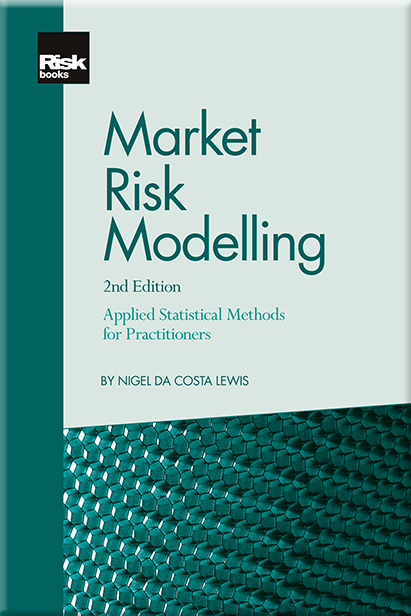Market Risk Modelling (2nd Edition)
Market Risk Modelling (2nd Edition)
Couldn't load pickup availability
The second edition of Market Risk Modelling examines the latest developments and updates in statistical methods used to solve the day-to-day problems faced by a risk manager. After almost a decade since the publication of the first edition, this book considers new risk management methodologies, approaches and packages.
Bringing together a wide variety of statistical methods and models that have proven their worth in risk management, Market Risk Modelling provides practical examples and easily implementable approaches, whereby readers can integrate the underlying quantitative concepts into their pre-existing risk management systems.
Written by market risk expert, Nigel Da Costa Lewis, this second edition gives concise and applied explanations of approaches to market risk modelling, demonstrated using relevant, applicable examples. Designed for the time-starved risk manager as both a working manual and a compact reference guide, this book provides rapid and succinct access to what can be an intimidating and complex subject.
The value of market risk statistical analysis in resource and performance evaluation and setting trading limits is long-established. Statistical methods provide an objective assessment of the risks facing a financial institution and, as importantly, offer their potential clients a fully transparent risk profile of products and services. Market Risk Modelling, Second Edition covers the topics key to risk modelling and management, such as EVT, principle components and fitting probability distributions.
A quickly digestible reference to this rapidly evolving field, Market Risk Modelling, Second Edition is a must read for all risk management professionals and quants who need practical and applicable insight into this vitally important subject.
Share

More information
About the Author
Table of contents
Preface
1 Risk Modelling and its Myths
2 Mastering the R Statistical Package
Getting Started in R How to Create and Manipulate Objects Managing your R Workspace Writing Functions in a Nutshell Graphical Output Programming in the R Language
3 Key Concepts on Probability
The Basics of Random Variables Risk Factors, Instruments, Random Variables and Mapping Probability Probability Mass Function and Probability Density Function Cumulative Distribution Function Percentiles and Percentile Function Bivariate Joint and Marginal Distribution Functions Multivariate Joint and Marginal Distribution Functions Expectation Conditional Expectation Variance and Standard Deviation Covariance and Correlation Six Useful Rules For Correlation, Variance and Covariance A Note on Populations and Samples Relevance Of Probability, Random Variables and Expectation
4 Tools for Describing Risk Factors and Portfolios
Calculating Risk Factor Returns Measures of Central Tendency Measures of Dispersion Measures of Shape
5 The Essentials of Hypothesis Testing for Risk Managers
The Basics: Normal Distribution Central Limit Theorem Hypothesis Testing
6 Alternative Methods to Measure Correlation
Popular Metrics for Measuring Correlation Hypothesis Testing and Confidence Intervals Other Useful Types of Correlation Coefficient
7 A Primer on Maximum Likelihood Estimation
The Likelihood Equation The Score Vector The Information Matrix Newton–Raphson Method Linear Regression
8 Regression in a Nutshell
Parameter Estimation Assessing the Simple Linear Regression Model R-Squared and the Regression Model Assumptions of the Linear Regression Model Multiple Regression
9 Fitting Probability Distributions to Data
Understanding Probability Distributions Library Of Probability Distributions
10 Practical Principal Component Analysis
Procedure for Principal Component Analysis Numerical Estimation of Principal Components Principal Component Analysis in Market Risk Management Scenario Analysis
11 Three Essential Models for Volatility
Mastering Volatility Moving Average Model The GARCH(1,1) Model Exponentially Weighted Moving Average
12 Random Numbers and Applied Simulation
Random Number Generation Generating Fat-Tailed Random Variables Historical Simulation and Monte Carlo Simulation Monte Carlo Simulation Case Study: The Role of Gold in Lifecycle Retirement Wealth Accumulation
13 Tail Risk Modelling
Value-at-Risk Modelling Calculating VaR Other Models for Calculating VaR Extreme Value Theory
14 Conclusion

